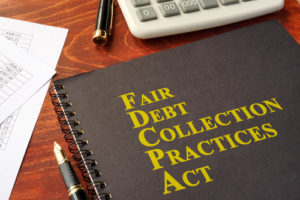
Fair debt collection is any performance of debt collection done in accordance with the Fair Debt Collection Practices Act (FDCPA), which was updated in 2006. This legislation is designed to protect debtors from harassment and abusive behaviors at the hands of debt collectors and collection agencies. Even though any pressure to pay debts can feel unfair, these specific regulations are meant to ensure that debt collectors do not go over the line. For example, fair debt collection means:
- Never using threats of violence against you
- Never lying to you about their identity
- Never threatening legal action if they do not intend to pursue it
- Never calling you during unreasonable hours
- Never smearing your reputation among friends and family
Sue the Collector is an organization dedicated to ensuring that debt collectors abide by these rules. We can analyze your situation, including how often collectors call you, to determine if legal action against those groups is warranted. Then, we connect you with a knowledgeable attorney who can represent you and fight for compensation on your behalf.
In the past, our clients have received up to $1,000 for harassment behaviors and up to $1,500 for each illegally-made robocall they were subjected to. We represent the “little guy” and make sure that individual citizens’ rights are respected by these companies.
If you believe that you have been subject to unfair debt collection practices, schedule a FREE consultation with a member of our team. Fill out the form on our contact page to let us know a little more about your situation. You can also call us directly at (866) 768-6005. Let us get you the compensation you deserve.
Signs That Your Debt Collection Is Unfair
The first step toward protecting your rights is to know what constitutes unfair debt collection practices. Regulations dictate when collectors can call, who they can discuss information with, how they can present themselves, and more.
When Collectors Can Contact You
In the past, a common complaint about debt collection agencies was that they called debtors at all hours, disturbing sleep and other life routines. Under the FDCPA, this is no longer the case. Debt collectors can only call you in the interval AFTER 8:00 a.m. and BEFORE 9:00 p.m.
Your Privacy Matters
Part of fair collection practices is respecting your privacy. Debt collectors are not allowed to threaten you with releasing your information as a punitive measure to harm your reputation. They are also not allowed to call friends and family about your whereabouts if they already have your location information.
Identification
Debt collectors are required to announce the company they work for when calling you. They cannot lie and say they are connected in any way to the U.S. government, such as pretending to be law enforcement officials and threatening criminal punishment.
Escalation
Another behavior that is banned by the FDCPA is the use of “escalating” language when the collector is not actually pursuing such actions. For example, the debt collector is not allowed to threaten a lawsuit or say things that imply legal action (like “we will let our attorneys know that you were not cooperative today”) if they do not actually plan on escalating your case to the next level. In other words, “empty threats” are against the law.
Fair Debt Collection Can Be Confusing
Sometimes, it can be difficult to judge whether a debt collector is breaking the law in its collection practices, especially if you do not have experience in these situations. For example, a debt collector may seem like they are harassing you by calling a lot, but this is not considered unfair practice if they actually have substantial communication with you. If they are simply robocalling you to annoy you, however, you may have a case for compensation.
For help understanding the complexities of fair debt collection practices, speak with a member of the Sue the Collector team today.
Get Your FREE Consultation on Fair Debt Collection
If you feel that a debt collector has behaved unfairly and violated your rights, you might be entitled to compensation. Sue the Collector can help you analyze your case and decide if legal action is warranted. If so, we can connect you with an experienced attorney who has a track record of success with debt collection violation cases.
Call our office today at (866) 768-6005 to schedule a FREE consultation on your case. You can also provide us with information via the form on our contact page. Let’s team up to hold debt collection agencies accountable for their bad behavior. In some cases, you could be eligible for compensation up to $1,500 for each robocall you have received. This compensation can add up quickly, so act now!




